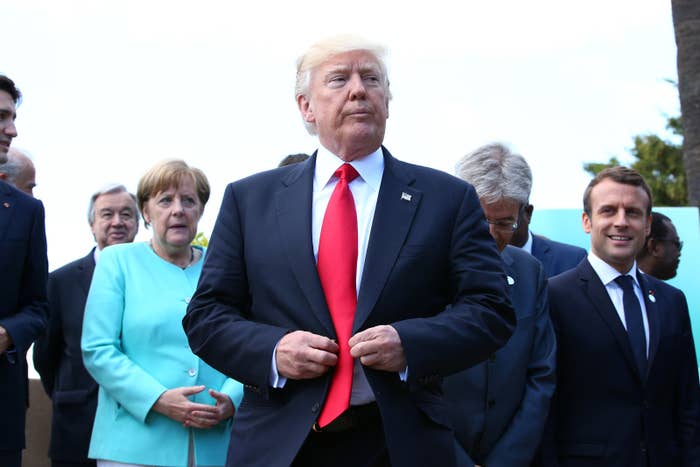
LONDON — US officials used an international meeting in Paris last week to backtrack on positions agreed less than two weeks earlier by President Donald Trump at the Group of Seven summit, raising questions about who is making decisions on international trade, a number of European diplomats told BuzzFeed News.
Members of the world’s most advanced economies failed to reach a consensus at a meeting of the Organization for Economic Co-operation and Development (OECD) council in Paris because the US rejected language on trade that was very similar to what Trump had agreed to in Italy.
European officials, including two present at the Paris meeting, told BuzzFeed News that some government representatives were so taken aback by the US stance that Denmark, which was presiding over the meeting, decided to issue a separate statement to the overall conclusions outlining the differences between the US and all other 34 OECD members.
“OECD meetings are usually peaceful,” one official said. "You don’t have late-night negotiations or emergencies like you have at European Councils because statements are consensual, and language mostly traces historical positions or agreements from other meetings. This time was different."
The US responded by issuing its own statement, making reference to a number of the principles that had been refuted during the G-7 process.
The unexpected change of tack has left some European officials baffled about how the Trump administration functions, and, on the heels of the Trump’s decision to abandon the Paris climate accords, worried about his perspective on fundamental global principles just as governments are preparing for next month’s G-20 summit in Hamburg.
According to three European diplomatic sources, all of whom spoke to BuzzFeed News on condition of anonymity because they weren’t allowed to discuss details of the meetings, Trump was personally responsible for overturning the view of several of his advisers at last month’s G-7 summit when an agreement was reached to include in a leaders’ statement references to fighting protectionism, the rules-based international trading system, and the World Trade Organization. Before the meeting, the US was steadfast in rejecting such references — in effect refusing to recognize the framework of the rules-based global trade order — and was pushing instead for the recognition of a plurality of trade systems.
European officials said the compromise language agreed by the seven leaders on trade, though not ideal, was understood to form an acceptable starting point at future meetings, including at next month’s G-20.
Diplomats from three European governments told BuzzFeed News that officials from the United States Trade Representative (USTR) explained the US’s contradictory stance by claiming that positions adopted at the G-7 and G-20 are White House commitments, while the USTR holds its own views, not linked to the White House in other forums such as the OECD.
“It is normal for different parts of governments to have different angles on a position, but a country has a clear position,” one of the diplomats said. “Here you have different bits of government, the president, trade, commerce, Treasury people, etc., etc., all with different positions. It’s absurd.”
All officials who spoke to BuzzFeed News described the US explanation as “odd.” They added, however, that the White House has provided assurances that at the G-20 the starting point would be the decisions taken in Taormina.
But European officials say the consistent confusion over processes at the G-7, G-20, and OECD events shed a light on how the Trump administration actually operates.
“Their argument is ridiculous. What this shows is that USTR and people like [Peter] Navarro [the director of the US National Trade Council] are clearly not happy with Trump’s decision in Taormina,” one official said, adding: “My sense is there are significant ideological differences between ‘globalists’ and ‘nationalists’ in Trump’s team.”
Another European official suggested the US administration didn’t appear to fully understand the mechanisms of international processes. “Its negotiators seem to lack clear instructions, and are constantly having to refer back to DC." the official said. "This has often meant very late contributions or confused positions."
USTR denies that there are different trade perspectives within the Trump administration. Emily Davis, a USTR spokeswoman told BuzzFeed News: "It's unfortunate that nameless European officials distribute false claims while showcasing their failure to understand that USTR is part of the Executive Office of the President and singularly advances his trade agenda. Negotiations of the OECD ministerial statements were conducted by all parties, including the United States, over a period of weeks preceding the meeting. The United States trade policy statement released at the OECD meeting unequivocally reflects the Trump Administration's long-held trade policy views."
But the overriding concern among the European officials is that the Trump administration continues to question principles that have underpinned international relations for decades.
“Even the Taormina language is sliding back to positions not held since the end of the Second World War. It is important to understand this,” one of the officials said, adding that some of the principles the US was rejecting were even in the founding act of the OECD, an organization the US was instrumental in setting up. The same official stressed though that it still wasn’t clear how the US stance on trade would unfold in practical terms.
At the OECD meeting, which came days after Trump’s decision to pull out of the Paris agreement, the US also continued to be at odds with other governments on climate change. The French were particularly uncompromising on anything relating to climate action, multiple sources told BuzzFeed News.
Officials said they expect the differences over both trade and climate change will feature again during the G-20 meeting in Hamburg next month.
UPDATE
This article was updated with a statement from USTR.
